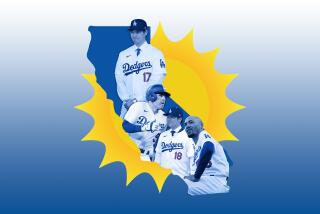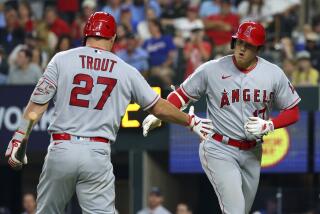Up to Old Tricks
The Angels have stumbled through the baseball desert for four decades, thirsty for some sort of identity. Gene Autry’s team. Disney’s team. The team with the Big A framing the scoreboard. The team with the rock pile in center field. The team that let Nolan Ryan go. The team in the shadow of the Dodgers.
But for all the slogans the marketing guys can think up and for all the curses, hexes and jinxes the die-hard fans can think up, the men wearing the uniforms this year might have provided the franchise with a long-lasting identity, a style of play that lends itself to such adjectives as “scrappy” and “plucky.”
To most teams, such words are condescending. Call these Angels by those terms, and they’ll thank you for the compliment.
For so many years, “The Dodger Way to Play Baseball” was a bestseller at the Dodger Stadium souvenir stands. This year, the Angels are writing their own success story. Another chapter begins Tuesday, when the Angels play the Minnesota Twins in the first game of the best-of-seven American League championship series.
“We are developing an Angel way of playing baseball,” bench coach Joe Maddon said. “We’re developing an attitude and a style. That is very important for us to capture and maintain. It’s something that can sustain itself.
“We may not win every year, but we can contend every year, based on the method of play we have kind of invented for ourselves this year.”
The Oakland Athletics popularized another brand of baseball, one in which walks and home runs are emphasized and sacrifice bunts and stolen bases are disdained, because they cost precious outs.
The A’s won 103 games this season and qualified for the playoffs for the third consecutive season, but they will not be participating in the championship series. The Angels will, with a “small ball” style ridiculed by the new breed of statistical analysts.
The Angels emphasize putting the ball in play, fouling pitches off to exhaust pitchers, stealing bases and executing hit-and-run plays, risking outs with aggressive baserunning and giving up outs in order to advance runners via bunt or ground ball.
This is old-fashioned baseball, playing for one run at a time, a pitching-first strategy in an offense-first era. This, the Angels decided, would be their best chance for success, for a team built upon a foundation of starting pitching.
“It’s a point we stressed in spring training,” center fielder Darin Erstad said. “The odds are not in our favor to knock out three or four hits in a row off the pitching in our division. We’ve got good pitchers, so how do we get them a lead?”
In that sense, while left fielder Garret Anderson was the Angels’ lone All-Star, shortstop David Eckstein might be the Angels’ most valuable player. He led the league in sacrifice bunts and times hit by a pitch. He walked more times than he struck out. He grounded into a double play once a month.
“He’s the RAM in our hard drive,” Maddon said.
So, when he saw Benji Gil get the sign to steal Saturday, he knew that Yankee second baseman Alfonso Soriano would be moving to cover second base. Eckstein poked the pitch through the hole vacated by Soriano, and Gil sped to third.
Erstad then singled home Gil, breaking a 2-2 tie. The Angels got six more runs in the inning. The Yankees were dazed and confused, their season terminated in the first round of the playoffs because Eckstein spied an opening.
“On a daily basis, he’s probably the smartest player on the field, including both coaching staffs,” Maddon said. “He sees everything. There’s nothing you can say to him in the game that he hasn’t already seen for himself.
“The guy is just dripping with intangibles. It rubs off on everybody else.”
Yankee Manager Joe Torre admitted the Angels’ baserunning exploits forced him to sacrifice offense and start strong-armed rookie Juan Rivera in left field. Still, in Game 2, Garret Anderson tagged up from first base and took second on a fly ball to left. Shawn Wooten, not the lightest guy on the field, hustled from first base to third on a single to center.
The fifth inning of Game 1 of the division series, the one game the Angels lost, was a work of art, one that hitting coaches will discuss at clinics for years to come. The Angels scored two runs, but they forced Roger Clemens to make 38 pitches in the inning.
With one out, Adam Kennedy forced Clemens to throw eight pitches and drew a walk. The Yankees pitched out, and guessed correctly that Kennedy would be running, but Eckstein refused to concede the throw to second base. He threw his bat at the ball, way outside of the strike zone, and the bat hit enough of the ball to foul it off. The Angels put the hit-and-run on again, and this time Eckstein singled Kennedy to third.
Erstad struck out, but Tim Salmon forced Clemens to throw eight more pitches and also drew a walk. Anderson then poked an outside pitch into left field, rather than trying to pull it, for a double that scored Kennedy and Eckstein.
If the Angels did not win, perhaps players would not buy into this system and would start swinging for the fences and striking out in reckless numbers. But the Angels had not won a playoff spot in 16 years, so Erstad, the team leader, found little resistance to enforcing a system that does not enhance individual statistics.
“We have to put our egos in our back pocket,” he said. “If you don’t do that, you’ll stick out like a sore thumb in here, so you really don’t have a choice.”
More to Read
Go beyond the scoreboard
Get the latest on L.A.'s teams in the daily Sports Report newsletter.
You may occasionally receive promotional content from the Los Angeles Times.






